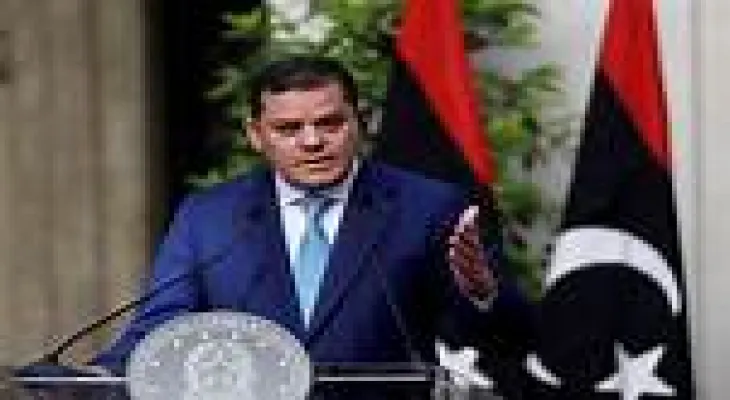Search here
Newspaper
Search here

Arab Canada News
News

Published: September 4, 2023
The Lebanese newspaper Al-Akhbar reported today, Monday, that Libyan Prime Minister Abdul Hamid Dbeibeh had discussions with Mossad chief David Barnea in 2022 to discuss practical steps for normalizing relations between Libya and Israel.
The report comes days after Dbeibeh dismissed his Foreign Minister Najla Mangoush for meeting with her Israeli counterpart Eli Cohen in Rome, claiming that she did so without his knowledge.
According to Al-Akhbar, the disclosure of the Mossad conversation was included in a "classified diplomatic document," and it was reported that the Libyan ambassador in Amman, Abdul Basit al-Badri, revealed it to another Arab country's ambassador.
The Lebanese report stated that al-Badri "personally attended" the meeting in Amman. It was not definitively clear whether Dbeibeh and Barnea were also present in the Jordanian capital; the report stated that the meeting took place in Amman, but later said that the conversation occurred "via video technology."
Reportedly, the purpose of the conversation was to discuss the possibility of providing Israeli political and military support to Dbeibeh, who governs the western part of Libya, in exchange for establishing official relations with the Jewish state.
It was also reported that Major General Ahmed Husni, the director of Jordanian intelligence, was responsible for the operational and logistical details to ensure that the talks were conducted in complete secrecy.
The oil-rich Libya, which fell into chaos after the ousting and killing of dictator Muammar Gaddafi in a NATO-backed uprising in 2011, has been divided since 2014 between competing administrations in the east and west. Prime Minister Dbeibeh, head of the internationally recognized government, rules from Tripoli over the western part of the country, while the east is under the control of strong military figure General Khalifa Haftar. The latter launched an offensive aimed at capturing Tripoli in 2019, backed by the United Arab Emirates, Egypt, and Russia.
Reportedly, the Dbeibeh-Barnea conversation was initiated by Jordan and the United Arab Emirates, two Arab countries with diplomatic ties to Israel, under American supervision. The UAE participated on the condition that the potential normalization agreement also includes Haftar's supported government.
It was reported that Haftar's son visited Israel in late 2019 and offered to establish diplomatic relations between the two countries in exchange for Israeli support; Israel has avoided taking a public stance on the war; however, it is widely regarded as allied with Egypt and the UAE in supporting Haftar. The Mossad has long managed Israel's secret relations with countries that do not maintain official diplomatic relations with it.
According to the diplomatic document revealed by Al-Akhbar, the Libyan ambassador in Jordan also stated that relations with Israel are being discussed in other diplomatic channels. Reports have also indicated that Morocco is leading communications to establish relations between the Jewish state and two other prominent figures in the fragmented Libyan political scene, namely the Speaker of the House of Representatives in the eastern part of the country, Aguila Saleh Issa, a presidential candidate aligned with Haftar, and Khaled al-Mishri, head of the Libyan State Council based in the west.
This revelation came just a week after Cohen disclosed his unprecedented meeting with Mangoush. This announcement sparked protests in Tripoli and other cities in Libya, a country known for its support of the Palestinian cause since Gaddafi's era.
While Dbeibeh publicly distanced himself from the meeting, many senior officials in the Libyan government stated that the Prime Minister gave the green light for the talks and was informed about them later.
Reportedly, the U.S. State Department was furious over the announcement of the Rome meeting, which was supposed to be kept secret. The Biden administration is said to have reprimanded senior Israeli officials for the "irresponsible behavior" of Foreign Minister Cohen, stating that he harmed all ongoing efforts to accelerate normalization between Israel and several Arab countries.
In an indirect rebuke to his foreign minister, Israeli Prime Minister Benjamin Netanyahu stated that the announcement of Israel's meeting with Libyan counterpart Cohen, which caused outrage in Tripoli and led to the dismissal of Najla Mangoush from her position, "was not helpful and was an exception to Israel's policy and the rule of secret communications, and his country will ensure it is not repeated."
In response to a question during an interview with Cypriot channel ANT1 regarding the scandal and whether the announcement of the meeting, which Cohen did last week, was helpful, Netanyahu replied, "Well, it was not helpful right now, that is clear," and made every effort to emphasize that the incident was unusual, while also confirming that Cyprus itself had hosted many of these secret meetings over the years.
He added, "This is an exception to the rule. Countless secret communications have taken place between Israel and Arab leaders, and Muslim leaders. In fact, many of them occurred in Cyprus; the Cypriot government has been extremely helpful over the years, very hospitable and highly secretive in facilitating these meetings, including some meetings that led to the Abraham Accords, but we were very careful not to disclose this early.”
Comments